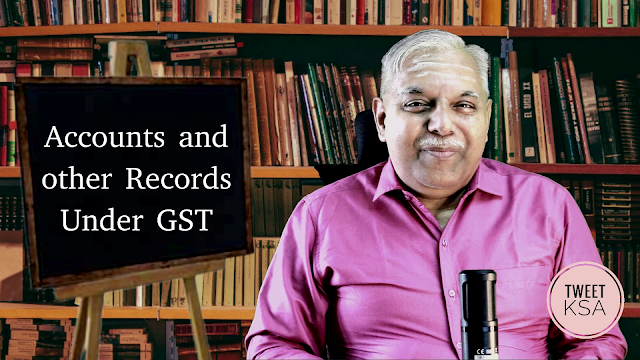Head office and Branch office
The 50th GST Council meeting had recommended to clarify through a circular that Input Services Distributor (ISD) mechanism is not mandatory for distribution of input tax credit of common input services procured from third parties to the distinct persons as per the present provisions of GST law, and also to clarify issues regarding taxability of internally generated services provided by one distinct person to another distinct person [such as branch offices of same entity].
The Council also recommended that amendment may be made in GST law to make ISD mechanism mandatory prospectively [for future] for distribution of input tax credit of such common input services procured from third parties.
It would do well to recollect at this juncture that in Schedule I to GST law, it sets out at entry 2 that the supplies between distinct persons would be deemed to be supplies, even when done without consideration.
Examples of distinct persons are branch offices in different states or being different GSTINs in same PAN. As per this entry, even when the offices of same legal entity bearing different GST registrations, make supplies of goods/services to each other, these are liable to GST on the supplies made between them. While there is a physical trail for the movement of goods between branches, tracking the services supplied has been challenging.
On the other hand, when the employees situated in one branch office were discharging functions to another branch of same entity, should it be taxed at entry 2 Schedule I at all as deemed supply between distinct persons or not? This confusion is due to Schedule III of GST has entry 1 services by employee to employer in course of employment are excluded from tax net, as neither a supply of goods nor of services. Where cross charge was done for supplies of services between branch offices, then there has been the confusion on the valuation of supplies, whether to add salary costs or not?
The advance ruling of Karnataka authorities in the case of Columbia Asia Hospitals Private Limited 2018 (15) G.S.T.L. 722 (A.A.R. - GST) approved in (2019 (20) G.S.T.L. 763 (App. A.A.R. - GST) would be important for reference here. In this case, it has been held that the services of employees working at corporate office to provide accounting, administration, and IT systems to other branches of the same company would be supplied liable for GST.
The ruling seemed to have erred as treating employee of the company as employee of particular branch or location.
Coming to ISD concept, "Input Service Distributor [ISD]"is an office of the supplier which receives tax invoices issued towards the receipt of input services and issues a document for the purposes of distributing the credit of tax paid on the said services to another branch office of same entity.
The credit on vendor invoices pertaining to specific recipient branches such as advertisement expense, is distributed to such branch. Common credit is distributed to the recipient branches, is distributed based on turnover basis.
There are many taxpayers who have not complied with ISD mechanism on the common expenditures incurred. Whether the credits were required to be distributed only under ISD mechanism or alternately could the vendor expenses at HO be cross charged, whether there could be excess/short distribution of credits were questions arising to assessee. Adding to this, taking the ISD registration and its compliance challenges have also been there.
In this backdrop, the latest circular 199/11/2023 was issued regarding ISD mechanism, tax on the input services procured by HO for branches as well as clarifying on services supplied between branch offices of entity in different states.
Whether head office [HO] can avail the ITC of common input services procured from a third party but attributable to Branch offices [BOs], and raise tax invoice to BOs for such input services, and the BOs can then avail the ITC for the same?
Yes. HO can opt to issue tax invoices to the concerned BOs in respect of common input services procured from third-party vendor by HO but attributable to the said BOs and the BOs can then avail ITC on the same [to extent used to make taxable supplies/zero rated supplies].
Is it mandatory for the HO to go under ISD mechanism to distribute ITC on common input services procured by them from a third party attributable to both HO and BOs or exclusively to one or more BOs?
Under present provisions of GST, it is not mandatory for the HO to distribute ITC by ISD route.
Such distribution of the ITC in respect common input services procured from a third-party vendor can be made by the HO to a BO through ISD only if the said input services are attributable to the said BO or actually been provided to the said BO.
Whether the HO is mandatorily required to issue tax invoice to BOs for internally generated services? Whether the cost of all components including salary cost of HO employees involved in providing the said services has to be included in the computation of value of services provided by HO to BOs when full input tax credit is available to the concerned BOs?
Vide the second proviso to Rule 28 of GST rules, in cases where full input tax credit is available to a BO, the value declared on the invoice by HO to the said BO in respect of a supply of services shall be deemed to be the open market value of such services. This is irrespective of the fact whether cost of any particular component of such services, like employee cost etc., has been included or not in the value of the services in the invoice.
If HO has not issued a tax invoice to the BO in respect of any particular services being rendered by HO to the said BO, where full ITC is available to the recipient, the value of such services may be deemed to be declared as Nil by HO to BO and may be deemed as open market value in terms of second proviso to rule 28 of GST Rules.
In respect of internally generated services provided by the HO to BOs, in cases where full input tax credit is not available to the concerned BOs, whether the salary cost of employees of the HO involved in providing said services is mandatorily required to be included while computing the value of the services provided by HO to Bos?
The cost of salary of employees of the HO, involved in providing is not mandatorily required to be included while computing the taxable value of the supply of such services, even in cases where full input tax credit is not available to the concerned BO.
Sum-up
What are internally generated services?
However rightly clarified circular that ISD is optional not mandatory. This was the correct view all along vide section 20(1) r/w 20(2) GST law, confirmed now in the latest circular.
Where assessee HO has cross charged for centrally procured services used to make supplies of services to branch offices, such as accounting/recruitment, this circular has removed doubts on denial of credit availed centrally on such expenses at HO.
Cross charge can be done by HO to branch office at any value when recipient branch can avail ITC. Valuation for such cross-charge u/r 28 of GST rules, is on open market value of same/similar services or cost plus 10%; Where recipient can avail full ITC, then invoice value [even nominal amount] is deemed to be the market value. Recipient Branch can avail full ITC when such inwards supplies from HO is attributed to its outward taxable supplies/exports/supplies to SEZ unit or developer.
For assessee who omitted to do cross charge during past 6 years, could certainly rely on this clarification citing that even when invoice not raised for supplies of service made, nil could be deemed as value of supplies made by supplier branch [no GST impact], when recipient branch was in position to avail credit.
Due to lack of clarity on including staff costs, and adverse ruling in Columbia Asia supra, employees’ costs formed a huge chunk of value of cross charge done to branch offices, leading to accumulated credit at recipient locations. The circular has clarified need not include employee costs in valuation, even when recipient provides exempt supplies and not in position to avail ITC.
This circular is a big relief in instances where dept during audit u/s 65, has been making inflated tax demands on supplies between branch offices, by including salaries/various expenses incurred at HO, even in cases where supplier DTA unit is making zero rated supplies of services, to recipient distinct person being SEZ unit of same legal entity and not required to charge GST at all!!
Note: It would do well to remember that circulars are binding on the department officers. Similarly held in Dhiren Chemicals Industries [2002 (143) ELT 19 (SC)].
How to address the following?
Whether the head office of XYZ Co Ltd, Bangalore which has procured common expenses such as audit fees, in 2022-23, benefitting all the 10 branches across India was compulsorily required to distribute credit through ISD?
No, it was not mandatorily required to distribute credit by taking ISD registration. It could have raised tax invoice, discharge tax as per the valuation mechanism set out in 28 of GST rules.
Based on market value of same/similar services or cost plus 10% or when recipient branch can avail ITC, any value declared in invoice would be deemed market value.
Whether the head office of XYZ Co Ltd, Bangalore which has procured software license from vendor, in 2022-23, benefitting 5 out of 10 branches across India was compulsorily required to distribute credit through ISD?
NO. They can raise cross charge invoice for the same.
When the head office of XYZ Co Ltd, Bangalore supplied accounting support services to its branches such as at Chennai and Gurgaon in 2021-22, whether it was required to cross-charge for such services, including salary costs of finance team employee?
It could take view that not liable to include salary costs, as such services by employees, was in course of employment, Schedule III entry 1.
When head office of Bangalore has supplied accounting support services to its branches at Chennai and Gurgaon in 2021-22, and raised tax invoices for cross charge in March 2023, when recipient branches provide taxable supplies, can such branches avail ITC?
If invoice was not raised in 2021-22, and HO raised tax invoice in March 2023, for services supplied and completed in 2021-22, voluntarily paid GST. Interest liability could arise for delayed payment of taxes. Recipient can avail ITC of tax charged by the HO Bangalore.
Cross Charge-Centralized Billing for the following expenses,
• Core/centralized accounting expenses
• Top management expenses
• Advertisement expenses Sales and marketing expenses
• Finance charges,
• Treasury administration expenses
• Cash management expenses
• Legal expenses and Audit fee (Statutory Audit, Internal Audit etc.)
• Tax/Management consultant fee
• Royalty fee and License Fee










